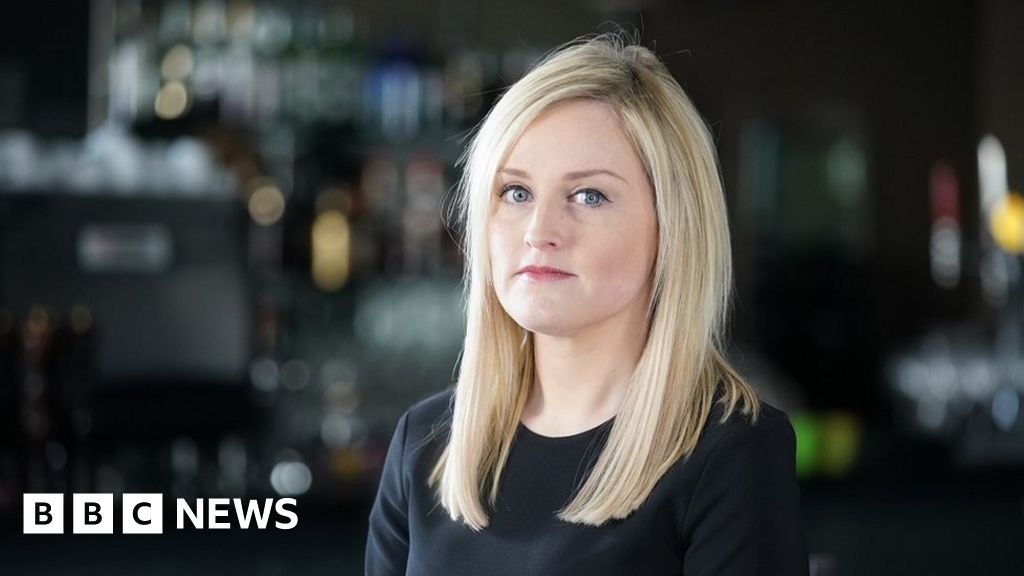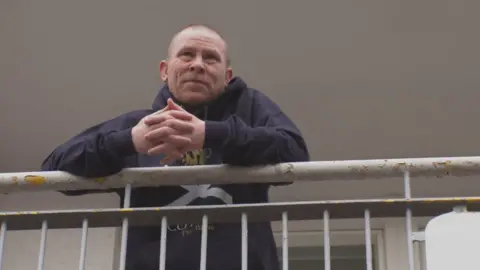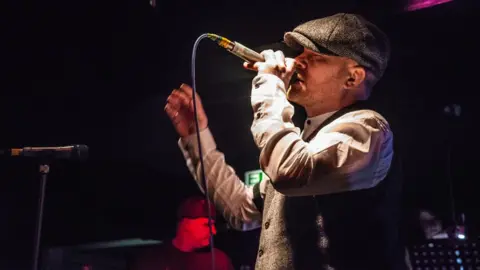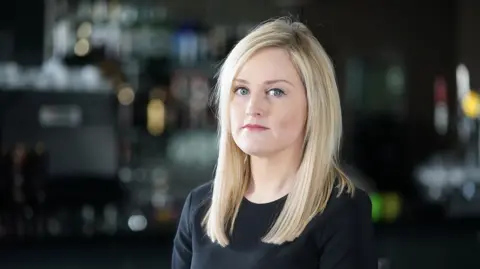
The stories of those hit by the economic crash
[ad_1]
Chief News Correspondent for The Nine
The impact of the economic crash caused by coronavirus is deep and wide. People from a variety of backgrounds have been left to grapple with a complex system of state benefits as they try to make ends meet. James Cook, chief news correspondent with BBC Scotland’s The Nine, has spoken to three people about the impact it has had on their lives.

The Tiler

“It’s been as worrying a time about finances as it has been worrying about a virus,” says Davie Mulhern, leaning over the second floor balcony of his flat in Glasgow’s Gorbals.
Davie has been a ceramic tiler since he left school at the age of 15 in 1989.
As a self-employed tradesman on building sites he knows how hard it can be to earn a living in a downturn, and he’s worried that the impact of this pandemic will be even worse than the recession of 2008/9, which forced him into bankruptcy.
“The last thing I want is for that to happen again,” he says, “but I’ve been left in a situation where that is a very distinct possibility.”
Davie, who has Type 1 diabetes, says he had been worrying about the virus long before most other people, wearing a mask on building sites despite mockery from his fellow workmen.
When the UK-wide lockdown was announced on 23 March, Scotland’s First Minister Nicola Sturgeon called for the immediate closure of almost all building sites.
“When Nicola shut down the construction industry I was delighted,” says Davie, “because the construction industry at that point was a free-for-all. People weren’t taking this seriously.
“Everybody’s hanging over each other. It’s very difficult to social-distance when you’ve get two men that need to carry something that weighs a ton and the thing’s not two metres.”
Davie is also a rap artist, best known for his work in the band Steg G & The Freestyle Master, but his income is predominantly from tiling.
 Derek MacKay/Aye Films
Derek MacKay/Aye FilmsThe lockdown, he says, was “a massive blow economically”, although he continues to regard it as essential to protect public health, including his own.
At the moment Davie is surviving on universal credit although he hopes that the UK government will eventually start paying 80% of his wages after the extension to the self-employed of its job retention, or furlough, scheme.
“I went back and checked my earnings,” he says. “Average of about £600 per week. So I’ve went from £600 to £94.”
Davie is full of praise for those who are holding society together during this national emergency.
“And that’s the binmen, that’s the nurses, the porters, the wee woman that cooks the food in the canteen, all the cleaners, the shopworkers,” he argues.
“We need to remember these folk. They are the key. We are the key. People are the key.”
The consultant
 Theodora Van Duin
Theodora Van DuinLaura Griffin quit her job at the worst possible moment.
It was early March and China was (inaccurately) reporting nearly 3,000 Covid-19 deaths but the virus was not her most pressing concern.
“My mental health had been really, really bad,” she says. “I had really bad anxiety, bad stress and I felt like the only option I had was to resign at that time.”
She handed in her notice as a digital consultant in a communications firm with the intention of spending two weeks on holiday in Cuba before returning to start afresh.
“I had talks with different people about different opportunities,” she says, and was looking forward to her break, confident about the prospect of a new job when it was over.
But with tourism grinding to a halt the holiday never happened and when the country went into lockdown, Laura, 31, was left in the “humiliating” position of asking her old employer to take her back so she could be furloughed.
Legally, they could do so, she points out, but they rejected her request.
“My employers have basically said to me, we just can’t help you. It would be irresponsible of us to do that,” she says.


Laura says she has had no help at all from the government. She says she has been told she is ineligible for both Jobseeker’s Allowance and Universal Credit.
She says she’s “really, really nervous” that her savings are going to run out, and in the meantime is relying on her partner to support her.
“I’m lucky in the sense that I had some savings put away, but I hadn’t been planning to use all my savings towards the Covid crisis,” she says.
“I’m going to maybe start looking for some kind of work,” she adds, “but it’s still a big risk to be going out and looking even for temporary work at the moment.”
The restaurateur

It is lunchtime in the heart of Hamilton in the middle of the working week and the blonde sandstone buildings are drenched in sunlight.
But Rocca Ristorante, an elegant 100-seater Italian, is closed for business.
“Every single member of my staff has been assured that their jobs are safe. They are continuing to be paid,” says owner Emma Allan.
The government’s furlough scheme to reimburse Emma for four fifths of the wages of her 32-strong team is “a massive positive”, she says.
Her own financial situation, though, is trickier. Like many business owners she is not being paid herself and has now dipped deep into her savings, spending “every penny” to keep the company afloat, she says.
Emma, 33, says she has been told she is not covered by insurance and that her business is not a realistic candidate for a grant or a loan.
For three weeks they tried to run a delivery service but with just a handful of staff, one car and the number of a local taxi firm, they were overwhelmed.
“Quite frankly, the demand is just far too vast. This weekend alone we had 708 missed calls…and we had 1,120 Facebook messages” says Emma.
But it wasn’t just pressure from customers which proved too much.
By Easter Sunday Emma was mourning an aunt who had died in London with Covid-19, and her manager – whose grandfather was in a care home where 13 residents had died – had “suffered a nervous breakdown”.
“It was really just time to stop at that point in time,” says Emma.
“Yes, we know that our business will suffer. Yes, we know that our finances are decimated. But we are exhausted and we’re drained. And we’re just emotionally now on our knees.”
For the moment Emma is continuing to volunteer in the South Lanarkshire community, providing freshly baked bread for her local food bank.
But the future is far from certain.
[ad_2]
Source link





